On the other side of the mountains from Pasadena is a little-known camp with a rich history called Paradise Springs.
Nestled in gorgeous, remote, wooded Fenner Canyon about 19 miles west of Wrightwood, 25 miles east of Palmdale, and less than 70 miles northeast of Los Angeles, the 165-acre property was once a debaucherous destination resort for Hollywood stars and elites in the 1920s and ’30s.
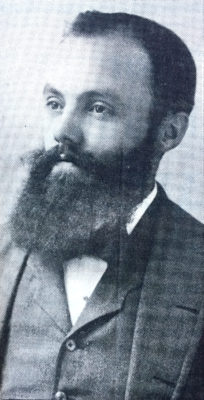
Originally owned by a Pasadena attorney named Louis Luckel and then established by silent film villain Noah Beery Sr., the camp was frequented by Charlie Chaplin, Joseph Kennedy, Francis X. Bushman, Gloria Swanson, William Randolph Hearst, Marion Davies, Jack Warner, Cecil B. DeMille, and many others. They threw wild parties there, brewed illegal homemade hooch during Prohibition, hosted tennis tournaments and gambling, operated a cathouse, and raised millions of trout.
It then switched gears and became a Christian camp in the late 20th century until it was sold in December 2017 to Huttopia, a French glamping company that has since revamped the property, staged a 2021 pre-opening and will officially celebrate a grand opening this Spring as part of its line of Huttopia Villages. The Village concept is a small community that blends in with the surrounding nature, combining the experience of a camping escape with communal spaces, meals, and outdoor activities.
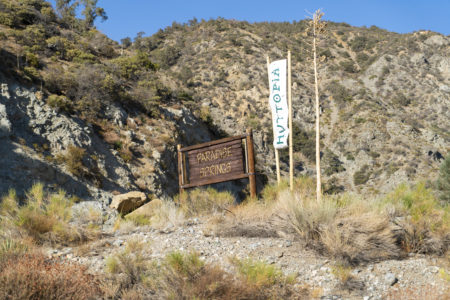
The 2021 ‘pre-opening’ was “a sort of exclusive boutique opening with 12 tents,” said Margaux Bossanne, brand and business development manager for Huttopia and manager of Huttopia Paradise Springs. Prices range between $220 to $450 per night.
Following the devastating period of time in which just about everyone had to cancel plans and trips and events and stay home for more than a year, people are looking for opportunities to get out, especially in nature, while also not having to struggle too much. Life has been hard in these new Roaring Twenties. Camping is sought after, while roughing it is not. Glamping—or glamorous camping—is an experience that could prove to be uniquely suited for this moment.
An oasis between desert and mountain
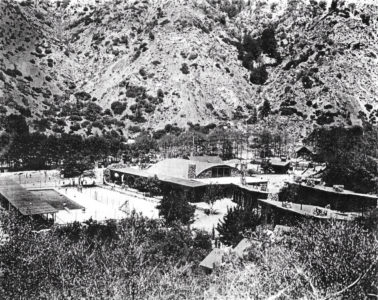
Before Fenner Canyon, where Paradise Springs is located, was first developed in 1902, early pinon-gathering Serrano indigenous people were the first to occupy the northeast-southwest canyon, situated at an elevation of 5,200 feet and bordered on both sides by dramatic rock outcroppings and steep ridges and populated with giant oaks, majestic evergreens, and poplar, alder, sycamore, and cottonwoods trees.
In the early 20th century, an avid outdoorsman and retired doctor from Pittsburgh named Caldwell Evans acquired 880 acres in the area, including the 165 that comprise Paradise Springs. In 1910, a prominent, successful, charismatic young lawyer from Pasadena named Louis Luckel purchased those 165 acres from Evans for $1.25 per acre, totaling about $200. Looking for a natural respite from the rigors and confrontational nature of courtroom battles, Luckel wanted to establish an upscale retirement campground for his family and friends, according to a history of the property written by Laurence “Gunner” Payne, who operated it as a Christian camp from 1965 to 1981.
“Bored with entertaining Hollywood royalty at his home in Pasadena,” according to a 1999 Daily Press article, Luckel set up 29 portable tents and cabins and he and his guests went fishing and hunting for bears, antelopes, and bighorn sheep. “He intended to sire seven sons, but ended up with only one nature-hating daughter” named Adelaide, who was also Payne’s aunt. She preferred the gentility and social graces of Pasadena to the rugged solitude and wilderness of Paradise Springs, Payne wrote.
During her first visit to the property in 1913, at age 13, Adelaide “shrieked when she realized she’d have to walk on dirt,” said Bill Hunt, marketing director for the Big Rock Creep Camp that operated on the Paradise Springs property from 1981 to 2017. “She hopped back into the limousine, never to return.” She soon convinced her father to sell the property when the opportunity came, leading to a couple of hard-partying actor brothers turning the place into a hedonistic wonderland for the stars.
A hedonistic wonderland for the stars
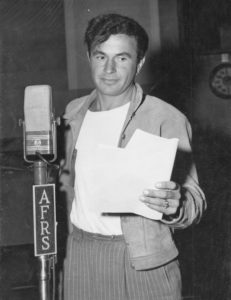
Noah Beery Sr. was born in 1882 and grew up on a farm in Missouri. He left home at 14 to sell newspapers in Kansas City, then sold peanuts and candy in theaters and circuses. While selling lemon drops at the Gillis Theatre in Kansas City, his booming voice caught the attention of actor Ned Risley, who convinced Beery to start a singing career. That led to melodramas. His young son, Noah Beery Jr.—who would become a successful actor himself in westerns—suffered a serious illness, leaving him with an $8,000 medical bill. Broke, he arrived in Los Angeles and booked a role in a suit of armor in Cecil B. DeMille’s 1916 movie about Joan of Arc called “Joan the Woman.” Paramount signed him and typecast him as a villain in silent movies such as 1921’s “Tol’able David,” 1923’s “The Spoilers,” and 1926’s “Beau Geste.”
A perennial nature lover and self-styled mountain man, Beery Sr. often went hunting in the hills around Mount Baldy. While on a hunting trip in the area in 1915, Beery Sr. happened upon Paradise Springs and took to it immediately. With the financial aid of his brother Wallace Beery, also an actor who later won an Academy Award for Best Actor for 1931’s “The Champ,” as well as funding from actors Charlie Chaplin and Mary Pickford, he made an offer to purchase the property from Luckel.
Adelaide urged and convinced her father to accept the offer. Luckel agreed, but included a shrewd clause in the sales contract that should the Beerys ever miss a mortgage payment or declare bankruptcy, the property would revert back to Luckel, who later bequeathed the property to Adelaide in his will when just that turn of events came to fruition decades later.
“Adelaide thought the property was one step out of hell,” Hunt said. “She hated it. And [actress] Gloria Swanson came and said, ‘Hey, honey, this is paradise.’ She’s the one who actually named the camp ‘Paradise Springs.’”
The Beery brothers’ plan for the property, which was just an hour and a half drive from downtown Los Angeles, was to cater to the Hollywood elite. They built an elegant ballroom and dining hall with grand vine-covered stone archway entrances, a high beam ceiling, a polished hardwood dance floor, a 45-foot redwood bar manned by several bartenders, and a stage big enough for a 22-piece orchestra. They also built 27 stone cabins, an Olympic-sized swimming pool, a tennis court, and 36 fish hatcheries consisting of a series of rock and mortar ponds through which the natural spring stream flowed, and stocked them with 1 million rainbow trout.
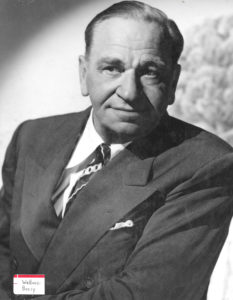
The Beery brothers loved to fish. In 1916, Wallace was credited with catching the largest sea bass in the world, at 515 pounds, off Santa Catalina Island. He held the record until 1952 when someone else caught a sea bass that was two pounds heavier.
Beery Sr. built his own river rock cabin next to the peaceful cascading ponds of Paradise Springs and called his new retreat Noah Beery’s Paradise Trout Club.
The brothers soon unveiled their getaway resort for Hollywood stars as the Roaring Twenties got underway. The LA Times reported that Beery Sr. “turned his ranch in Big Rock Canyon (near Saugus at Valyermo in the Antelope Valley) into a fishing paradise and will open it to friends Sunday. In the lap of Old Baldy on the north side of the mountains it is heavily wooded and traversed by numerous fast-flowing streams well stocked with trout.”
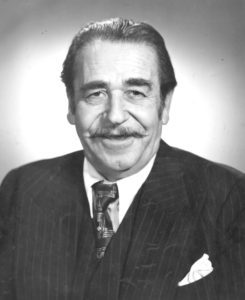
For seven years, the Trout Club sold 1,500 pounds of fish every other week to two posh, swinging Hollywood establishments: the Cocoanut Grove nightclub at the Ambassador Hotel and the Brown Derby restaurant, two hotspots to see and be seen in Old Hollywood if ever there were any.
According to Beery Sr.’s son, Noah Beery Jr., the retreat quickly became a libidinous weekend destination for the first generation of celebrities in the Golden Age of Hollywood. Beery Jr. was also an actor and performed in 748 movies and TV shows, including the popular television series “The Rockford Files” in the 1970s. He lived at Paradise Springs from 1920 when he was 10 to 1937 when he was 27.
Hunt, the Christian camp’s marketing director from 1995 to 2005, interviewed Beery Jr. for three days in August 1994, shortly before Beery Jr. died of a cerebral thrombosis on November 1, 1994, in Tehachapi, California, at the age of 81. Hunt said “you wouldn’t believe some of the stuff he told me” about what went on at Paradise Springs during the 1920s and 30s when the Beery brothers owned it. “Everything was illegal. Everything was so illegal. Some stuff I didn’t even want to write [down]; it was sordid. I mean, it was unbelievable.”
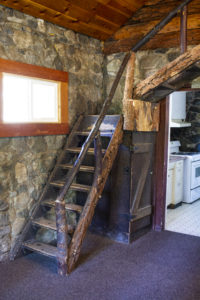
For example, in 1923, Charlie Chaplin built a rickety, winding staircase—still standing today—by himself in Beery Sr.’s cabin. The stairs led up to the second-floor bedroom that Chaplin used for his “extramarital romantic trysts,” according to Hunt, who learned it from Beery Jr. It was Beery Jr.’s job to warn Chaplin that his wife was coming up the hill so he and his mistress could escape out the back window.
“Charlie Chaplin loved Paradise Springs and invested heavily in its operations and events,” Hunt said. “Those crazy stairs that lead to the upstairs bedroom in Noah’s cabin, Charlie Chaplin literally built them himself.”
Beery Jr. told Hunt that he took hundreds of photos during his time at Paradise Springs and kept a diary about his father’s “hanky-panky place.”
‘Buffalo in the ballroom!’
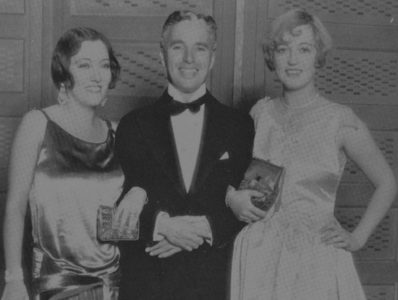
For a while, money was no object to the Beerys. They added a zoo to the property with an elephant, kangaroos, buffalo, and camels. In its heyday during Prohibition, Paradise Springs hosted up to 1,000 guests each weekend, including Chaplin, Pickford, Swanson, Fairbanks, Jack Warner, Cecil B. DeMille, W.C. Fields, William Randolph Hearst and his mistress Marion Davies, Francis X. Bushman, and many others.
“Glamorous Hollywood stars of the 1920s and 30s arrived by limousine for a weekend of bootleg liquor, on-site gambling, and the services of would-be starlets,” Hunt wrote. “The original clubhouse was an elegant showplace with a high-beamed ceiling, the arched rock entrance to the ballroom, and a polished hardwood dance floor. The Paradise Trout Club was notorious for its extravagant parties.”
The Beerys also had a fierce rivalry going with newspaper magnate William Randolph Hearst and their respective resorts. Unlike at Paradise Springs, Hearst didn’t charge his guests to visit Hearst Castle in San Simeon, but it was much further away from Hollywood than Paradise Springs was. While San Simeon is 245 miles from LA, Paradise Springs is just 66 miles away. So Hearst commissioned seven private passenger trains to take guests from Union Station in downtown LA every Friday to San Simeon and back again on Sundays.
After the Hearst Castle was built in 1919, Hearst “spent a fortune bringing the A stars to San Simeon by private passenger trains rather than having them attend Beery’s Paradise Springs,” Hunt said.
And in 1928, during one of the many lavish, exclusive parties thrown by the Beerys in Paradise Springs’ grand ballroom, Hearst exacted his revenge. The structure had eight stone archway entrances, one of which was painted red. That door was reserved for the “diva of the weekend,” usually Swanson. Beery Jr. told Hunt that during a party on May 25, 1928, the ballroom was packed with 1,000 people. Shortly after Kennedy escorted Swanson through the red door and they made their grand entrance and took the seats of honor, there was a loud knock at that red door.
An enraged Kennedy, thinking it was Jack Warner or Cecil B. DeMille playing a prank, opened the door—and a giant bison charged past him into the ballroom, taken from the compound’s zoo and “stationed there by Hearst’s goons.”
Pandemonium broke out in the ballroom.
The confused animal slid across the dance floor and knocked over tables and chairs as celebrities and starlets in formal attire screamed and scrambled.
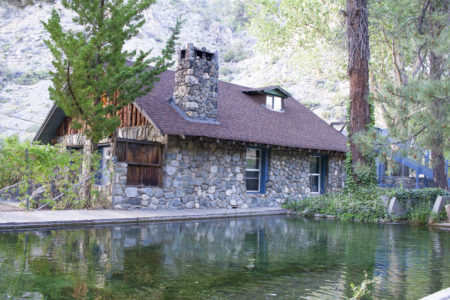
Teenage Beery Jr. ran up to Noah’s Ark, his father’s cabin, and yelled, “Dad! Dad! There’s a buffalo in the ballroom!” Beery Sr. hurried down to the ballroom, grabbed a shotgun from behind the bar, jumped up on top of the bar, and shot the beast betwixt the eyes.
He then apologized to his guests and invited all 1,000 of them to return the following weekend for a free buffalo barbecue. Chaplin had a taxidermist from Brooklyn fly to LA to stuff and mount the buffalo’s head before the subsequent party.
“Many believed Hearst was the one who hired the thugs to drag the buffalo in the ballroom,” Hunt said.
The Demise of Noah Beery’s Paradise Trout Club
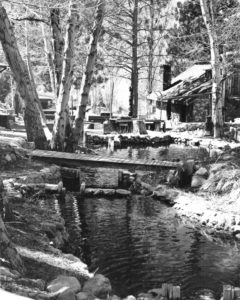
The Trout Club, and Beery Sr.’s paradise, did not last forever, however. It turned out that the mountain water was too cold for trout propagation, upon which his business plan was dependent.
“Little did Noah Beery Sr. know that his decision to open this resort would eventually bring the tough-guy film star to his knees financially,” wrote Barry Colman in a 1988 article in Los Angeles Magazine. “That it would turn him into a ‘judgment debtor,’ unable to pay an $82 court judgment just five years after signing a five-figure contract for three weeks of filming.”
In 1930, the grand ballroom was destroyed by a mysterious fire.
“Many believed Hearst had it started by some of his thugs because of an argument he had with Wallace,” Hunt said.
Only the stone arches survived, which remained until Huttopia renovated the property and removed the arches last year due to earthquake safety concerns.
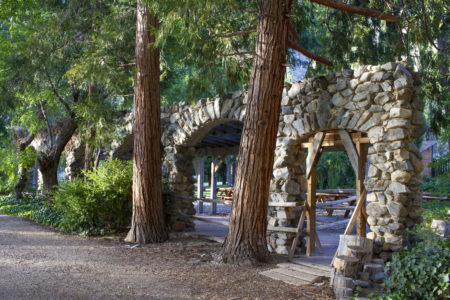
“They were a ‘high risk’ due to the seismic area,” Margaux Bossanne said. “They were pretty old and wouldn’t have held up.”
In 1932, the LA Times reported that Beery Sr. “doesn’t have any bank account or jewelry or securities or any safe-deposit box. And that’s why he hasn’t paid an $82 judgment rendered against him more than a year ago. ‘Yes, I own Paradise Ranch. Yes, there are fish on the place, but the income from the ranch isn’t enough to feed the fish,’ he declared under questioning by an attorney for the collection agency.”
While he continued to make many more movies, his “box office draw started to fade,” Colman wrote. “The Trout Club remained a financial, if not emotional, albatross until his death of a heart attack in [Beverly Hills] on April 1, 1946.” The New York Times wrote the next day in his obituary that the “veteran film actor died in the arms of his brother, Wallace Beery. He was at Wallace’s home on a leave from his engagement in a New York stage play (where he had begun his career), Up in Central Park. His death occurred on Wallace’s birthday. He was 64 years old.”
His official obituary noted that “a few hours later [the Beery brothers] were to have appeared together in a radio dramatization, and Wallace and his daughter, Carol Ann, upheld one of the theater’s oldest traditions by carrying on in the scheduled broadcast” even after Beery Sr.’s death earlier that same day. Wallace died three years later, also at age 64.
‘In stark contrast to the property’s racy past’
Hunt wrote that “as the Great Depression deepened its grip on the nation, and the ‘in crowd’ moved on to other amusements, the money at Paradise Springs dried up.”
Beery Sr. and his Paradise Trout Club went bankrupt in 1940, triggering the clause in the original 1915 sales contract with Louis Luckel that reverted the entire 165-acre property back to the Pasadena attorney who originally sold Paradise Springs to Beery Sr. Upon Luckel’s death on May 3, 1952, his daughter, now Adelaide Pettijohn, came into possession of Paradise Springs, per his will.
Adelaide leased the property to a succession of entrepreneurs over the next few years to operate as limited resort businesses, but none of them had much success in turning a profit.
“Having no interest whatsoever in the property, Adelaide luckily again entrusted the management of the property to her nephew Laurence ‘Gunner’ Payne,” Hunt wrote. “Immediately, Payne accepted the challenge to enthusiastically renovate the campground back to its original ambience. The new owners operated the camp in stark contrast to the property’s racy past.”
The camp’s new rules were: no alcohol, no gambling, and no dances. Sunday services took the place of debaucherous ballroom shindigs, with no interruptions from party-crashing buffalo.
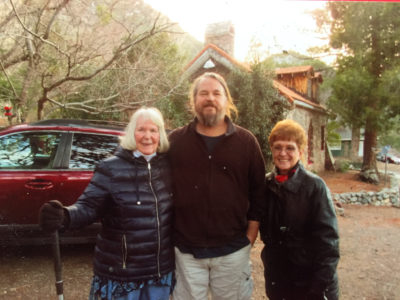
Paradise Springs Campground opened in Spring 1971. But the effort drained the Payne family so much that by 1981, Payne was ready to sell, and a group of investors consisting of four families answered the call: Bilgrave, Odell, Seed, and Lakshmanan. They continued the Christian emphasis. In 1992, after once again weathering a rough economic patch, the camp was renamed “Big Rock Creek Camp.”
The new Christian owners were well aware of—and even embraced—the property’s seedy past. Several pamphlets advertising Big Rock Creek Camp’s offerings told the old Hollywood stories. Like Noah Beery Sr.’s Paradise Trout Club, Big Rock Creek Camp also had a zoo, albeit with a somewhat less exotic variety of beast. The modern-day owners kept horses, llamas, emus, donkeys, turkeys, ostriches, goats, geese, sheep, pheasants, and a hawk. No buffalo this time.
By 2017, without a significant amount of new investment, the four families who owned Big Rock Creek Camp felt they could no longer continue to operate the camp.
“We ran it for more than 35 years, from 1981 until 2017, and there wasn’t much purpose in us running it anymore,” Jonathan said.
At the end, he said they were $17 or $18 in the black.
“So we did well; we actually were profitable,” he said with a laugh.
In December 2017, they sold Paradise Springs to the French glamping company, Huttopia.
‘A new kind of vacation in nature’

By the time Huttopia founders Philippe and Céline Bossanne called the Odells’ real estate agent in September 2017, they were already considering a different offer from Nestlé, the Swiss multinational food and beverage conglomerate corporation, which was interested in the water from the spring on the property that generates up to 1 million gallons a day.
The four families liked that Huttopia was going to keep Paradise Springs as a camp with a focus on families and that they’d put some money into upgrading the property.
“That seemed responsible,” Jonathan said. “We researched what Huttopia does and their other properties and what they look like and the type of clientele they serve. We trust that Huttopia will be good neighbors.”
The Odells kept one acre of the property and sold 144 acres to Huttopia. Paradise Springs was 165 acres when Luckel and Beery had it, 145 when it was a Christian camp, and 144 when Huttopia bought it.
Paradise Springs is Huttopia’s first location on the U.S. West Coast, though they are developing another one in California’s wine country. Their other North American locations are in Maine, New Hampshire, New York, and Québec, Canada. The rest are in Europe and China.
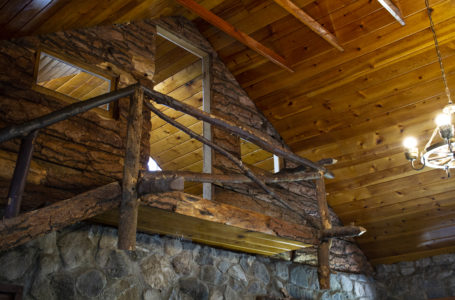
Wilma Odell, Jonathan’s mother and a one-time director of Big Rock Creek Camp, added that she just hopes “nobody ever takes away [the Charlie Chaplin-built] staircase [in Noah Beery’s cabin] because of the history of it. It needs to stay there.”
Bossanne said Huttopia is very interested in the history and culture of Paradise Springs, and fully plans to respect and highlight that history, including Chaplin’s staircase.
“That’s what we are selling, actually: nature and culture,” he said. “The history of this place is so amazing. I really would like to feature the history in some way.”
Bossanne said Huttopia Paradise Springs is a big step for his company, which was founded in Lyon, France, in 2000.
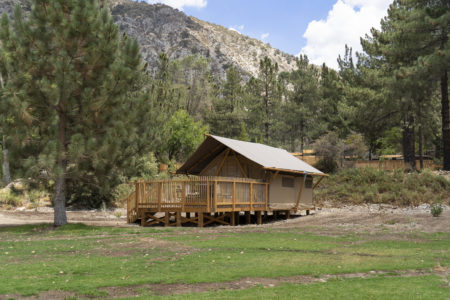
“Paradise Springs will be a wonderful Huttopia,” Bossanne said. “It’s nice, it’s quiet, it’s so close to LA. The fishing will be great for the families. There are so many activities to do in the mountains: hiking, bicycling, horse riding. We were so surprised to find such a place in LA County, right in the middle of the national forest, which just became a monument.”
In 2014, President Obama designated 346,177 acres of existing federal lands as the San Gabriel Mountains National Monument, which includes the Angeles National Forest in which Paradise Springs is located.
He added that glamping takes the difficulty out of camping, making it easier for families to enjoy the natural surroundings.
Huttopia will maintain many of the existing structures, cabins, river rock ponds, the kitchen, the pool, and other features that survived from the Beery, Payne, and Big Rock Creek Camp eras. Last summer, features such as the swimming pool and restaurant were open, while the cabin with Chaplin’s staircase and other features will be available this year during Huttopia’s full opening season.
Huttopia Paradise Springs is located at 18101 Paradise Dr., Valyermo, CA 93563. Learn more at https://canada-usa.huttopia.com/en/site/paradise-springs.





